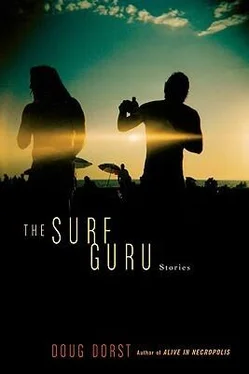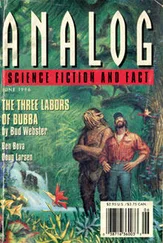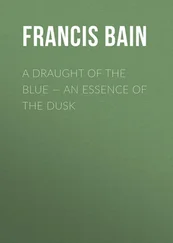It’s reverse time but that’s cool, she still has the rhythm, still has the groove, and when she grips the shift she hears that Feat song in her head: If you give me weed, whites, and wine, and you show me a sign, I’ll be willin’ to be movin’. I’m willing , she thinks, I’m willing and I’m moving . She drops it into reverse and starts back, smoothly, smoothly, no problem. She checks her mirrors, she’s drifting a little, no problem, turn into the drift, get the trailer righted, turn back, no problem. She’s on a roll, she’s rolling, she can do this in her sleep, and a month from now she’ll be waking up in her rig just off Highway 58 in Tehachapi with Lowell George singing to her as she watches the sun rise over the fields of windmills.
“Congratulations,” Jim says. “You just flattened my fucking grandmother.”
She winds her way up the Los Altos hills, the Fiesta’s engine slipping almost every time she hits the gas. Sometimes, instead of backing off so that the gears can catch, she stomps the pedal harder, making the engine scream. She wants to hear the noise.
The pint bottle of Jack that she bought in Gilroy is in the passenger seat, half-empty. All she wants to do is get back to the pool, to Shane and his tennis ball, to the floating chair, where she’ll be able to sit alone and drink and enjoy the warmth of the sun and the fruits of the Crenshaws’ medicine cabinet. She’ll call Wayne and promise something vague, buy herself some time.
Jo turns into the driveway. Spencer’s car is gone, but now there are two others: in the open garage, the Crenshaws’ convertible; in the driveway, Wayne’s pristine white ’72 Comet. Before her foot touches the brake she remembers that the house is a mess, that the Crenshaws, who have always trusted her, always given her a place to stay, have come home to dead plants, a pool full of beer cans, tire tracks across the lawn. And now Wayne is there. He could be sitting in the living room, sobbing. He could be holding them hostage with a kitchen knife. Hard to know with him anymore. One thing she does know: they’re waiting for her.
She also knows that the gas pedal, the true patron saint of lost causes, is the one thing that’ll get her out of this, but she feels drawn to the house — feet on the driveway, on the flagstone path, on the front steps — feels like she’s marching toward something she’s meant to confront. The only question rolling through her mind as she stares blearily at the wood grain of the door is whether she should ring the bell or just walk right in.
The four of them are sitting around the table by the pool. Mrs. Crenshaw is sipping iced coffee and Kahlua from the astronaut mug— That’s mine! Jo has the urge to tell her — and gazing off at the summer-brown hills in the distance. Jo and Mr. Crenshaw have vodka gimlets that the older man insisted on mixing. Wayne is holding a bottle of mineral water loosely by the neck. Birds are chirping. Shane is racing around in the yard, chasing squirrels, snapping at bugs like nothing at all is amiss.
“I’m a reasonable man,” Mr. Crenshaw says. “I don’t expect the house to be perfect if we come home early. But this?” He raises his palm up. He could be referring to the entire universe. “This is too much. It raises serious questions.” He rattles the ice in the glass to free the last few drops of his drink. He pours himself another from the cocktail shaker, which is sweating.
Jo nods. She glances quickly at Wayne. His head looks too large for his frame now that he has no hair. Four red-spotted bandages decorate his scalp, covering the nicks. He sits tall in his seat, composed, looking waxen in the bright sun. “It looks like there was a party here last night,” Wayne says, in a flat, uninflected voice she hardly recognizes.
“It does, Wayne,” Mrs. Crenshaw says.
“A regular Cinco de Mayo,” Mr. Crenshaw says.
This feels wrong to her, like it’s happening on a sound-stage, everything and everyone too quiet, too detached. Confusing and creepy. Or is she just too wasted to understand everyone’s angle?
“It’s rude to bring strangers into other people’s homes,” Wayne says, tapping his glass on the table — gently, but it makes her nervous anyway. He’s never had a good sense of his own strength. She wonders if he found Spencer here. If he hurt him. But those aren’t the kinds of things you just ask out of the blue.
“I’m sensing a pattern of irresponsible behavior,” Mr. Crenshaw says.
Wayne turns to the other man. “Me, too,” he agrees. “Jo isn’t focusing on her responsibilities these days at all.”
Wayne is up to something, she thinks. Or he’s on new and weirder meds. Maybe both. Even the Crenshaws seem strange, precariously calm. “I’m sorry,” Jo says. “I let some things get away from me.”
“Would you like to talk about it, Jo?” Mrs. Crenshaw asks.
“We could help, if you’d let us,” Mr. Crenshaw says.
“I took a workshop on enneatypes,” Mrs. Crenshaw offers.
“You’re definitely a Six.” She puts down the mug and drops her hand, limp and sweaty, on Jo’s bare arm. “I’m a Three,” she adds.
“Can someone tell me what’s going on?” Jo says quietly.
“Your friend Wayne has been very worried about you,” Mr. Crenshaw says. “And, from the sound of it, for good reason. It sounds like you might need some help. Guidance. Therapy. Something.”
Jo doesn’t know what Wayne told them, but it had to have been a lie. And they’re trusting him over her? She’s not the one who ended up in the fucking emergency room getting her stomach pumped. But she feels too tired and sunken to mount a defense. She stands up on shaky legs. “This is too weird,” she says. “I’m leaving.”
“See?” Mrs. Crenshaw says. “That’s classic Six.”
“Suit yourself, Jo,” Mr. Crenshaw says. “But if that’s your attitude, we have to sever ties. We have to let you go.”
“What?” Jo asks. “Let me go where?” She steals a glance at Wayne. She thinks she sees a ghost of a smile appearing at one corner of his mouth.
“You’re burning bridges here, Jo,” Wayne says.
“We’re not saying you’re a bad person,” Mrs. Crenshaw says.
“No,” Mr. Crenshaw says, swirling his drink. “But you don’t seem willing to give us the respect we think we deserve.”
“That’s not healthy for us,” Mrs. Crenshaw says.
“We’ve done a lot for you,” Mr. Crenshaw says.
“We’ve known you a long time.”
“Well, we thought we knew you.”
“Relationships are important, Jo,” Wayne says. “You don’t just go around burning bridges.”
“Exactly, Wayne,” Mr. Crenshaw says. He drains his glass, spits an ice cube into the bushes. “We’ve said our piece,” he says. “I’m sorry it has to end this way. I’m guessing now that you two have things to talk about. Which we’d prefer you did elsewhere.” He pulls out his checkbook, clicks his pen, and fills out a check while humming tunelessly to himself. He thumps a period after his signature, then tears the check out and slides it across the table to Jo. “Happy trails,” he says.
Mrs. Crenshaw watches Jo closely as she gathers up her belongings, then stands in the foyer and holds the front door open for her. Wayne is in the driveway, leaning on the Comet and smoking a cigarette. Can you please walk out there with me? she wants to ask. I can’t trust him right now. But the front door closes behind her, and she knows that the Crenshaws will be just as happy without her, a Happy Couple with a house and a dog and a pool and numbered personalities and a daughter who’ll soon be able to write any prescription they want.
Wayne flicks his butt into the grass and stares at her. Jo, her face burning, specks of light dancing in her field of vision, says, “Are you trying to scare me? If you are, can we get it over with?”
Читать дальше












